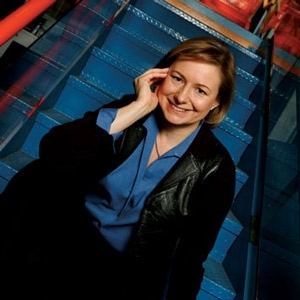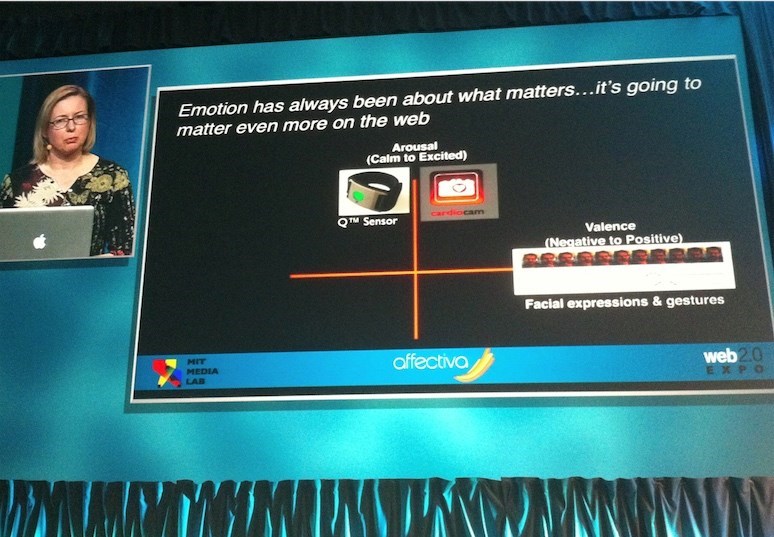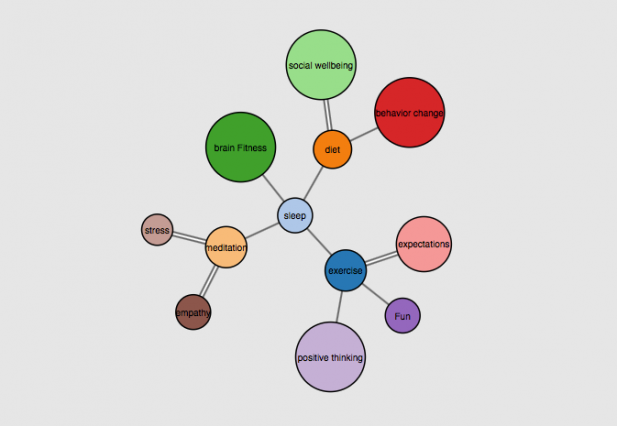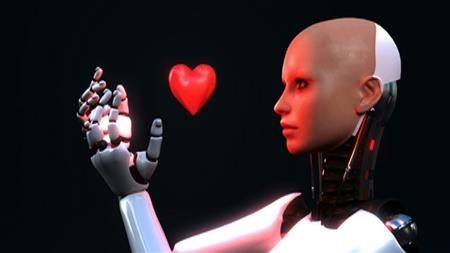 |
| Professor Rosalind Picard (Media.Mit.Edu) |
Internationally known as an innovative leader in envisioning and creating innovative technology, Rosalind Picard is a mother, wife, author, scientist, professor, human being and very nice person to interview. She's also really smart! She also happens to be founder and director of the Affective Computing research group at the Massachusetts Institute of Technology (MIT) Media Lab and co-director of the Things That Think Consortium, as well as begin co-founder of Affectiva Inc, delivering technology to help measure and communicate emotion.
She has all kinds of degrees, all kinds of awards and distinguished lectureships, sits on many prestigious boards of important companies, editorial boards, has written over 200 scientific articles, books, is a consultant, as well as holding multiple patents, "having designed and developed a variety of new sensors, algorithms, and systems for sensing, recognizing, and responding respectfully to human affective information, with applications in autism, epilepsy, autonomic nervous system disorders, sleep, stress, human and machine learning, health behavior change, market research, customer service, and human-computer interaction. I do wonder if she ever sleeps.
Rosalind very graciously gave MY HERO a telephone interview and this is what she had to say.
MY HERO: What made you go into and get multiple degrees in electrical engineering and computer-science. And can you tell us in simple terms what it is you do?
"I liked technology and math and the thought of making a better future and inventing things that make the world a better place really appealed to me. It seemed magical to me to see how things work and sounded pretty cool to sit in classes for engineering that tell us how to do it ourselves. I also thought I could get a job and it's a good secure future in this field. We need so many more in these fields and there are many jobs to be filled."
 |
| Emotion (Media.Mit.Edu) |
"What do I do? I get to do whatever I want to do which is pretty amazing, my job. When I see a problem I am interested in I get to try to figure out how to solve it in an innovative and creative way. Can we do something unique or valuable with the opportunities we have and the expertise we have to be able to move a solution forward.
Most of your readers on MY HERO can relate to feeling fatigue or activated, calm or hyper. Those are physical feelings people can relate to but there are people who don't really understand feelings and this condition is called alexithymia. They are confused by feelings. 90% of people on the autism spectrum have this and maybe 25% in college, so it's kind of hard to ask someone how they are feeling and for them to tell you if they are not connected to emotion.
MY HERO: What about depression?
"There's not an on off switch for depression. You get into it slowly. The question is what caused you to slide into it? It's usually a series of lots of little things that caused the slide. We are trying to understand what those things are that cause you to be more resilient and what things make you succumb to it. Two people may have the same situation happen to them and handle it totally differently. What is it that builds strength? What it is that tears you down? It's like raindrops over time can wear through concrete. It's the same with depression. What is it in your day to day like that makes you sick? We understand that when we work out too hard we feel it physically and what to do to correct that. What we are looking for is the equivalent of that emotionally. what wears us down emotionally? We are interested in how the brain interacts with emotions and health."
 |
| Graphic of WELLBEING Media Lab MIT (Media.Mit.Edu) |
The MIT Media Lab is "committed to looking beyond the obvious to ask the questions not yet asked - questions whose answers could radically improve the way people live, learn, express themselves, work, and play." This Media Lab recently launched the wellness initiative and Rosalind, one of the three principal investigators on the initiative said: "Wellbeing is a very hard problem that has yet to be solved by psychologists, psychiatrists, neuroscientists, biologists or other experts in the scientific community. It's time to bring MIT ingenuity to the challenge."
MY HERO: You wrote the book AFFECTIVE COMPUTING that was a catalyst for starting a new field by that name. What is affective computing and why is it important?
"Affective Computing is computing that relates to, arises from, or deliberately influences emotion. This deliberately influences emotions to make you smile more, have more attention, feel more peace, to respond to peoples emotions."
MY HERO: Why do you think it is necessary for computers to have emotions?
"It depends. I don't argue that all computers should have emotions. I prefer having the skills to emotional intelligence. You can have many of the skills of emotional intelligence without having emotion. For instance: A computer could listen to the voices of callers and say this is an angry caller and I will reroute to someone who can help calm them down now. When a customer is upset you will treat them differently than if a customer is pleased. It would require a different response. If you treated them the same way it would be emotionally unintelligent. It doesn't take emotions to make that decision it just takes being able to recognize emotions. Distinguishing having emotions from recognizing emotions from expressions. (smiling, making voice modulate to sound interested or bored. as you make those changes you are expressing those emotions differently.
What computers should have emotions? What does it mean to have them? If you see a robot smile you think it has emotion but it may just be a computer program.
If it is a social computer people expect it to emote appropriate to the situation. If you are telling it bad news it should not smile. Talking to it, it should respond to what you are saying. We can do this without it having feelings. We can make it look like tit is emotionally smart. Then there is how we feel inside. The emotions cause a bias in your brain that says do this not that. That feeling of bugging in your brain.. thoughts tell you what to do but feelings move you more. We are much more driven by feelings than our thoughts. As we learn about our feelings the better we can understand our behavior and can understand what is influencing out thought.
 |
| MIT Media Lab (wikipedia) |
MY HERO: Will what you do have an effect on education and how we teach and how we learn?
"Those are great questions. I don't think there will be a whole new one way of learning but varied ways of learning. In the same person we may need to learn subjects differently. If there is a subject I'm really interested in and I'm sleep deprived, I can attend an hour talk and still be ok. But a history class, I think I should be interested in and I am sleep deprived? I won't be able to stay awake. Maybe I need to take that class in story style as lecture style puts me to sleep.
I love a math lecture but others hate it. With history I do better in a social group. What ever you are more interested in depends on how you want to learn it: lecture or group discussions, story style or one on one or visual. It all depends on your intrinsic motivation, sleep, how many other things are competing for your attention like boyfriend, girlfriend, family situations, you can be distracted.
We actually have an Indie Go Go campaign going now called EMBRACE WATCH: The first wearable to help measure stress, epileptic seizures, activity and sleep. “It can let kids see which of their friends are emotional vampires, what classes they really respond to and which they don’t. What gets them jazzed enough to focus on it. If a person is interested there arousal goes up and the watch can tell by what is happening on your skin. If you are not interested your arousal goes down.
You can have the data the watch collects computed and have a bar graph up front and hooked into the audience smart phones the teacher can get a pictures or their arousal… up or down.”
MY HERO: Do you share what you do with your husband and kids?
“Depends on their age and how they do it. My 2 younger sons wanted to wear the wrist bands and one told me about giving his 6 year old friend a purse to see if her emotions went up. But as they get older they don’t want to wear anything that looks geeky.”
MY HERO: Many people outside of the MIT media lab think that what you do there stands on the precipice of science fiction. Did you read science fiction growing up?
“I have read some science fiction but I did not grow up reading it. I read what friends recommend that I am interested in.”
 |
| Robot Love by Rosalind Picard and Matt Gray (Media.Mit.Edu) |
MY HERO: Have their been challenges you’ve had to overcome being a woman in these fields?
“Oh yes. There is still a lot of sexism but at MIT they are very supportive. They are interested in what you can do and the more different you are the more you fit in here. That said, there are still a lot of bias and people are subject to stereotypes.
MY HERO: What advice would you give young woman about going into your field?
“Find something you love to do and don’t let people get in your way and if people say you can’t do something, become more determined. This field can enable you to change things you don’t like around you. This field really gives you the capability to change things people thought could not be changed.”
MY HERO: Who is your hero and why?
The historical figure of Jesus because he was brilliant always putting others first. He had the most powerful teachings and how he told stories and got people to really change their lives and their behaviors. And if you believe he is God incarnate… I am blown away by the stories of what he did not just the bible books but his lasting impact on peoples lives worldwide, even people who are not Christians respect him.
MY HERO: If you had the attention of the world for 5 minutes what would you do or say?
“I might say each of you is love and each of you is special and made for a reason and set aside the selfishness and hatred for difference and embrace the difference and find something to do together that is better than what you can do alone.
Better for the human race. Ultimately all the technology we build is in service to people. To enable people to live better lives. To allow the human race to be something greater than it has been in the past.
Another piece is that all human beings have equal worth. I work a lot with people who are disabled and believe me, we all have equal worth.”
Page created on 3/21/2015 2:41:37 PM
Last edited 1/7/2020 8:10:23 PM
